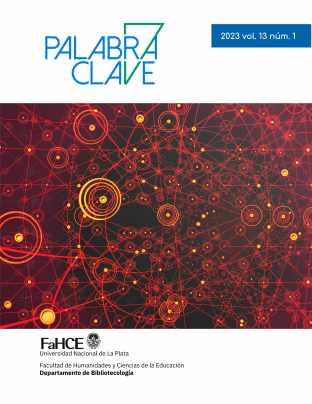Competência cultural na gestão da diversidade: estudo de caso em uma biblioteca pública
Contenido principal del artículo
Resumen
O artigo tem como referencial teórico a gestão da diversidade e a competência cultural. Tem como objetivo identificar os modos de gestão da diversidade em uma biblioteca pública do interior do estado de São Paulo, estabelecendo uma reflexão teórica entre essa gestão e o desenvolvimento da competência cultural na organização. Foram avaliadas as relações entre os propósitos do planejamento organizacional e as ações desenvolvidas pela equipe da biblioteca. Foi identificada a importância da informação e da comunicação para a promoção da diversidade e avaliada a percepção de conflitos na biblioteca. A diversidade cultural e a competência cultural foram consideradas nos processos organizacionais. Aplicou-se o método de pesquisa Estudo de Caso. Os resultados consistem no seguinte: a biblioteca possui uma abordagem de gestão alinhada com o objetivo de ser uma referência cultural local para as diversas culturas, experiências e subjetividades; a própria equipe da biblioteca indica a percepção da diversidade da biblioteca e a importância da representatividade para o desenvolvimento e execução de projetos interculturais; a informação e a comunicação entre a biblioteca e o público auxiliam no compromisso com a diversidade; a biblioteca tem como objetivo promover atividades que ajudem diferentes grupos sociais. A pesquisa conclui que o desenvolvimento de competências nos níveis individual e organizacional é uma solução para atingir a convivência e a integração de grupos multiculturais. Desta forma, a competência cultural demanda ações que envolvem fluxos de informação e comunicação eficientes entre grupos de indivíduos distintos; isso pode potencializar a gestão da diversidade nas organizações.
Descargas
Detalles del artículo

Esta obra está bajo una licencia internacional Creative Commons Atribución-NoComercial-CompartirIgual 4.0.
La cesión de derechos no exclusivos implica también la autorización por parte de los autores para que el trabajo sea alojado en los repositorios institucionales UNLP (Sedici y Memoria Académica) y difundido a través de las bases de datos que los editores consideren apropiadas para su indización, con miras a incrementar la visibilidad de la revista y sus autores.
Citas
Amado, J. & Freire, I. (2014). Manual de investigação qualitativa em educação. En J. Amado (Ed.), Estudo de caso na investigação em educação (pp. 121-143). Coimbra: Universidade de Coimbra. DOI: https://doi.org/10.14195/978-989-26-0879-2
Benedito, B. O., Ribeiro, M. A., Damian, I. P. M. & Woida, L. M. (2022). Perspectiva entre gestão do conhecimento e gestão da diversidade. Informação & informação, 27(1), 126-150. Recuperado de https://brapci.inf.br/index.php/res/v/195060 DOI: https://doi.org/10.5433/1981-8920.2022v27n1p126
Camillo, E. S. & Silva, B. D. O. (2021). Gestão da diversidade na biblioteca escolar. Revista ACB: biblioteconomia em Santa Catarina, 3(26), 1-17. Recuperado de https://brapci.inf.br/index.php/res/v/168717
Candau, V. M. (2020). Diferenças, educação intercultural e decolonialidade: temas insurgentes. Revista espaço do currículo, 13, 678-686. Recuperado de https://periodicos.ufpb.br/index.php/rec/article/view/54949 DOI: https://doi.org/10.22478/ufpb.1983-1579.2020v13nEspecial.54949
Carvalho-Freitas, M. N., Silva, O. A., Tette, R. P. G. & Silva, C. V. (2017). Diversidade em contextos de trabalho: pluralismo teórico e questões conceituais. Economia e gestão, 17(48), 174-191. Recuperado de http://periodicos.pucminas.br/index.php/economiaegestao/article/view/16769 DOI: https://doi.org/10.5752/P.1984-6606.2017v17n48p174-191
Center for Culturally Proficient Educational Practice. (2020). What is cultural proficiency? Recuperado de https://ccpep.org/home/what-is-cultural-proficiency/
Cross, T., Bazron, B., Dennis, K. & Isaacs, M. (1989). Towards a culturally competent system of care. Washington: CASSP Technical Assistance Center, Center for Child Health and Mental Health Policy, Georgetown University Child Development Center.
Gerlin, M. N. M., Fraga, A. N. & Rosemberg, D. S. (2013). A biblioteca pública na sociedade multicultural. Em Congresso Brasileiro de Biblioteconomia, Documentação e Ciência da Informação-FEBAB, 28, 585-598. Recuperado de https://portal.febab.org.br/cbbd2019/article/view/1272
Gil, A. (2008). Métodos e técnicas de pesquisa social (6 ed.). São Paulo: Atlas.
Gomes, S., Augusto, C., Lopes, M. & Ribeiro, V. (2008). A gestão da diversidade em pequenas e médias empresas europeias. Coimbra: Respons & Ability.
International Federation of Library Associations and Institutions (IFLA). (2022). Manifesto da Biblioteca Pública IFLA/UNESCO 2022. Recuperado de http://repositorio.febab.org.br/items/show/6247
Martínez, M. F., Martínez, J. & Calzado, V. (2006). La competencia cultural como referente de la diversidad humana en la prestación de servicios y la intervención social. Psychosocial intervention, 15(3), 331-350. Recuperado de https://www.redalyc.org/pdf/1798/179814012007.pdf DOI: https://doi.org/10.4321/S1132-05592006000300007
Melo, J. (1998). Teoria da comunicação: paradigmas latino-americanos. Rio de Janeiro: Vozes.
Mestre, L. S. (2010). Librarians working with diverse populations: What impact does cultural competency training have on their efforts? The journal of academic librarianship, 36(6), 479-488. Recuperado de https://www.sciencedirect.com/science/article/pii/S0099133310002119 DOI: https://doi.org/10.1016/j.acalib.2010.08.003
Ouvrard-Prettol, E. (2017). What cultural competence means for librarians: how to cultivate this important skill to positively impact our patrons. Young adult library services, 15(2), 27-28. Recuperado de https://www.ala.org/yalsa/sites/ala.org.yalsa/files/content/vol-15-no-2-winter-2017_0.pdf
Richardson, R. (2012). Pesquisa social: métodos e técnicas. São Paulo: Atlas.
Rodrigues, A. (1994). Cultura e comunicação: a experiência cultural na era da informação (2ª ed.). Lisboa: Presença.
Sales, R. (2016). Políticas de diversidade nas organizações: breve histórico, modelos e reflexões. Em Intercom. XXXIX Congresso Brasileiro de Ciências da Comunicação, São Paulo, Brasil. Recuperado de https://portalintercom.org.br/anais/nacional2016/resumos/R11-1693-1.pdf
Santos, J. V. M., Santana, A. C. & Arruda, G. D. (2017). Diversidade nas organizações: inclusão social ou estratégica competitiva. Psicologia-pt, 1-13. Recuperado de https://www.psicologia.pt/artigos/textos/A1170.pdf
Yin, R. (2001). Estudo de caso: planejamento e métodos (2ª ed.). Porto Alegre: Bookman.
